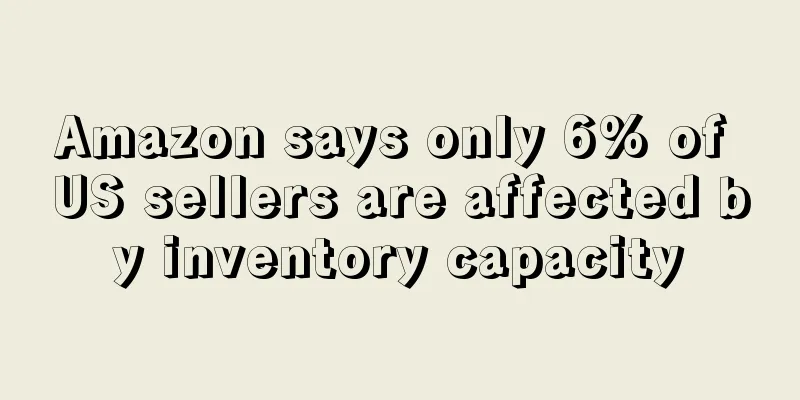If you don’t buy insurance or your account is suspended, individual sellers can also buy insurance

|
In the past two days, the Amazon insurance incident has once again attracted the attention of sellers. Sellers have many questions: Do only those who receive emails need to buy it? Do FBA sellers need to buy it? Do only certain categories need to buy it? What will happen if you reach the limit and do not buy insurance? Can personal accounts be insured?
We understand that if a seller reaches the monthly sales limit of $10,000 but does not purchase insurance, Amazon may restrict their sales in specific categories or even suspend their account; and the problem of insurance for individual sellers, which sellers are most concerned about, has also been solved.
Chinese sellers going overseas must strengthen their awareness of risks and safety. Yesterday, some sellers on Amazon US reported that their accounts were suddenly deducted tens or even hundreds of thousands of dollars, and their account balances turned negative. One of the sellers consulted customer service and learned that the amount was deducted for a product that had never been sold before.
No insurance purchased or account suspended
On Tuesday, Amazon announced that it will update its insurance requirements starting September 1.
Under current regulations, sellers with sales of $10,000 or more on Amazon for three consecutive months must purchase product liability insurance and designate Amazon as an additional insured. However, this requirement will be updated soon. Starting September 1, 2021, the platform's Business Solutions Agreement will require sellers with monthly sales of $10,000 or more on Amazon.com to purchase product liability insurance and designate Amazon as an additional insured.
As of yesterday, more and more sellers have received Amazon insurance notification emails, but the content of the emails received by different sellers is different. Some emails are exactly the same as the news notification, while others only mention part of the news content. Sellers in some categories have not even received the emails. Sellers have a lot of questions about which sellers or categories need to purchase, etc.
Yesterday afternoon, many sellers consulted Amazon about insurance. In response to the seller's question "What are the requirements for purchasing insurance?", Amazon replied: Once you reach a certain sales threshold, you need to purchase valid insurance according to your seller agreement. This is a must-buy, regardless of the category.
What happens if the seller does not have insurance?
Amazon backend shows: If you reach certain sales limits, you need to maintain valid insurance under the seller agreement. If you do not obtain the required insurance, then regardless of the sales threshold, we will seek compensation for the costs we incur in settling the claim, unless we agree to waive the right to compensation. We may also restrict you from selling products in certain categories, or even suspend your account until you provide proof of insurance. We will notify you of any such action.
If you are not required to purchase insurance and the buyer files a claim, we may require you to purchase insurance; if you then provide proof of insurance, we will not seek compensation from you for claims under $1,000, but we will require you to provide compensation for any claims over $1,000.
Individual sellers can also purchase insurance
After Amazon issued the insurance requirement, corporate sellers were relatively calm. To purchase insurance, they only needed to fill in the information and pay the fee. However, individual sellers were in a state of panic. Many sellers asked, "How can I insure my personal account?" Some sellers also analyzed the strategies of the four insurance companies provided by Amazon to domestic sellers. Questions such as "Individual sellers cannot be insured" and "Individual sellers cannot solve the problem" increased sharply.
Soon, a seller said : "Ping An can insure individuals. Enter your name and ID card to get a quote. Amazon has approved it." Other sellers also reported that they consulted several companies recommended by the platform and found that Ping An can insure personal accounts. The editor confirmed this with Ping An Property and Casualty Insurance staff and received a definite reply: individuals can also be insured. Individual sellers are insured by ID card number, and there is no difference between other accounts and corporate accounts.
Ping An is also an insurance company recognized by Amazon, and both corporate and individual sellers can be insured. It is understood that Ping An Insurance can quickly assist sellers to complete the entire insurance process, issue English insurance certificates, and issue orders online, with the fastest completion time of 1 hour, simple process, online claims and global services.
The specific insurance process is as follows:
1. Fill in the insurance information online (both individual and corporate sellers can purchase insurance) 2. Online insurance confirmation and premium payment (online payment or public payment) 3. Ping An issues insurance policy and certificate 4. Submit the insurance certificate to the Amazon platform
Scan the QR code below, or click to read the original text to purchase insurance:
Peace Poster
While hurriedly consulting about purchasing insurance, a group of sellers suddenly found that their accounts had been inexplicably deducted, and the amount was not small!
A group of sellers were suddenly deducted money, and some were deducted more than 1 million US dollars
Yesterday, a seller broke the news to the editor that his account was operating normally and his products were selling normally, but he was suddenly deducted hundreds of thousands of US dollars and did not receive any email notification.
This is not an isolated case. Yesterday, many Amazon sellers encountered similar problems. The amount of money deducted ranged from hundreds of thousands to more than one million US dollars. This situation currently only occurs on the US site.
A seller posted on the Zhiwubuyan forum that one account was suddenly deducted $180,000, and another account was deducted $370,000. The deduction details showed "other", without any notification, only the deduction amount. Then, more sellers reported the deductions↓
“——Over 600,000 RMB was deducted. Currently, I guess it’s because a product in the store was removed from the shelves and the inventory was frozen. There is no way to appeal, but I don’t know if this is the problem. ——Exactly the same +1, added a few more with similar situations, so miserable; ——A friend’s backend showed a negative $1.1 million. He said that the products he had sold were recalled, and he thought Amazon would not deduct the money. ——We also had an account that was deducted more than 200,000 US dollars yesterday . "
Sellers were suddenly deducted without any notice, and they were rushing to find the reason. One of the sellers checked the payment transaction list in the backend and saw that the deduction details showed "other". The transaction report also showed "other". The platform did not specify the specific reason. He opened several cases to consult customer service, but the answer he got was that they could not find the reason and had helped to transfer it to the relevant team.
However, according to the deducted sellers, the products sold by several of the sellers involved in this scam had problems. One seller said that he had sold hot air combs, and last year a batch of hot air combs were detained by the US Customs due to quality problems; another seller who was deducted had his products recalled, and another seller whose money was deducted had his products removed from the shelves.
The seller who broke the news to the editor consulted the customer service, and the customer service said that the reason for the deduction was a trampoline product. After checking, the Canadian health department fined this product for health reasons. However, the seller has never sold this product, but was suddenly deducted. The reason needs to be investigated separately. At present, the seller is preparing to file a complaint.
The sellers whose money was deducted this time were almost all because there were problems with the products they sold, but of course the possibility of misjudgment cannot be ruled out.
Amazon will pay for third-party sellers' product problems starting September 1
Sellers who don’t want to lose money must pay attention to product safety issues. Amazon is currently checking these issues more strictly, and may be even stricter in the future. Because Amazon just announced in recent days that it will pay compensation to American customers who purchase defective products sold by third-party sellers on the platform and suffer injuries or property losses.
Amazon also said that the new compensation policy will take effect on September 1, with a maximum compensation of $1,000, and the platform will pay directly to customers. Although third-party sellers are still responsible, Amazon said that if the seller has valid insurance, Amazon does not expect the seller to reimburse these expenses.
Why did Amazon suddenly come up with this new policy? Previously, many products sold on Amazon had been sued, such as laptops exploding and burning customers; dog leashes with quality problems that injured customers; baby cradles with safety hazards that threatened babies' lives, etc. After several lawsuits, the US court ruled that Amazon was responsible.
Amazon should be responsible and compensate customers. The sellers must pay for this, after all, the products are sold by the sellers. Therefore, the supervision of the platform will be stricter in the future. Yesterday, a group of sellers were suddenly deducted, and Amazon sellers were required to buy insurance, which may be related to this matter. Next, sellers should pay special attention to product safety issues. In the past two days, the Amazon insurance incident has once again attracted the attention of sellers. Sellers have many questions: Do only those who receive emails need to buy it? Do FBA sellers need to buy it? Do only certain categories need to buy it? What will happen if you reach the limit and do not buy insurance? Can personal accounts be insured?
We understand that if a seller reaches the monthly sales limit of $10,000 but does not purchase insurance, Amazon may restrict their sales in specific categories or even suspend their account; and the problem of insurance for individual sellers, which sellers are most concerned about, has also been solved.
Chinese sellers going overseas must strengthen their awareness of risks and safety. Yesterday, some sellers on Amazon US reported that their accounts were suddenly deducted tens or even hundreds of thousands of dollars, and their account balances turned negative. One of the sellers consulted customer service and learned that the amount was deducted for a product that had never been sold before.
No insurance purchased or account suspended
On Tuesday, Amazon announced that it will update its insurance requirements starting September 1.
Under current regulations, sellers with sales of $10,000 or more on Amazon for three consecutive months must purchase product liability insurance and designate Amazon as an additional insured. However, this requirement will be updated soon. Starting September 1, 2021, the platform's Business Solutions Agreement will require sellers with monthly sales of $10,000 or more on Amazon.com to purchase product liability insurance and designate Amazon as an additional insured.
As of yesterday, more and more sellers have received Amazon insurance notification emails, but the content of the emails received by different sellers is different. Some emails are exactly the same as the news notification, while others only mention part of the news content. Sellers in some categories have not even received the emails. Sellers have a lot of questions about which sellers or categories need to purchase, etc.
Yesterday afternoon, many sellers consulted Amazon about insurance. In response to the seller's question "What are the requirements for purchasing insurance?", Amazon replied: Once you reach a certain sales threshold, you need to purchase valid insurance according to your seller agreement. This is a must-buy, regardless of the category.
What happens if the seller does not have insurance?
Amazon backend shows: If you reach certain sales limits, you need to maintain valid insurance under the seller agreement. If you do not obtain the required insurance, then regardless of the sales threshold, we will seek compensation for the costs we incur in settling the claim, unless we agree to waive the right to compensation. We may also restrict you from selling products in certain categories, or even suspend your account until you provide proof of insurance. We will notify you of any such action.
If you are not required to purchase insurance and the buyer files a claim, we may require you to purchase insurance; if you then provide proof of insurance, we will not seek compensation from you for claims under $1,000, but we will require you to provide compensation for any claims over $1,000.
Figure 1
Individual sellers can also purchase insurance
After Amazon issued the insurance requirement, corporate sellers were relatively calm. To purchase insurance, they only needed to fill in the information and pay the fee. However, individual sellers were in a state of panic. Many sellers asked, "How can I insure my personal account?" Some sellers also analyzed the strategies of the four insurance companies provided by Amazon to domestic sellers. Questions such as "Individual sellers cannot be insured" and "Individual sellers cannot solve the problem" increased sharply.
Soon, a seller said : "Ping An can insure individuals. Enter your name and ID card to get a quote. Amazon has approved it." Other sellers also reported that they consulted several companies recommended by the platform and found that Ping An can insure personal accounts. The editor confirmed this with Ping An Property and Casualty Insurance staff and received a definite reply: individuals can also be insured. Individual sellers are insured by ID card number, and there is no difference between other accounts and corporate accounts.
Figure 2
Ping An is also an insurance company recognized by Amazon, and both corporate and individual sellers can be insured. It is understood that Ping An Insurance can quickly assist sellers to complete the entire insurance process, issue English insurance certificates, and issue orders online, with the fastest completion time of 1 hour, simple process, online claims and global services.
The specific insurance process is as follows:
1. Fill in the insurance information online (both individual and corporate sellers can purchase insurance) 2. Online insurance confirmation and premium payment (online payment or public payment) 3. Ping An issues insurance policy and certificate 4. Submit the insurance certificate to the Amazon platform
Scan the QR code below, or click to read the original text to purchase insurance:
Peace Poster
While hurriedly consulting about purchasing insurance, a group of sellers suddenly found that their accounts had been inexplicably deducted, and the amount was not small!
A group of sellers were suddenly deducted money, and some were deducted more than 1 million US dollars
Yesterday, a seller broke the news to the editor that his account was operating normally and his products were selling normally, but he was suddenly deducted hundreds of thousands of US dollars and did not receive any email notification.
Figure 3
This is not an isolated case. Yesterday, many Amazon sellers encountered similar problems. The amount of money deducted ranged from hundreds of thousands to more than one million US dollars. This situation currently only occurs on the US site.
A seller posted on the Zhiwubuyan forum that one account was suddenly deducted $180,000, and another account was deducted $370,000. The deduction details showed "other", without any notification, only the deduction amount. Then, more sellers reported the deductions↓
“——Over 600,000 RMB was deducted. Currently, I guess it’s because a product in the store was removed from the shelves and the inventory was frozen. There is no way to appeal, but I don’t know if this is the problem. ——Exactly the same +1, added a few more with similar situations, so miserable; ——A friend’s backend showed a negative $1.1 million. He said that the products he had sold were recalled, and he thought Amazon would not deduct the money. ——We also had an account that was deducted more than 200,000 US dollars yesterday . "
Sellers were suddenly deducted without any notice, and they were rushing to find the reason. One of the sellers checked the payment transaction list in the backend and saw that the deduction details showed "other". The transaction report also showed "other". The platform did not specify the specific reason. He opened several cases to consult customer service, but the answer he got was that they could not find the reason and had helped to transfer it to the relevant team.
However, according to the deducted sellers, the products sold by several of the sellers involved in this scam had problems. One seller said that he had sold hot air combs, and last year a batch of hot air combs were detained by the US Customs due to quality problems; another seller who was deducted had his products recalled, and another seller whose money was deducted had his products removed from the shelves.
The seller who broke the news to the editor consulted the customer service, and the customer service said that the reason for the deduction was a trampoline product. After checking, the Canadian health department fined this product for health reasons. However, the seller has never sold this product, but was suddenly deducted. The reason needs to be investigated separately. At present, the seller is preparing to file a complaint.
The sellers whose money was deducted this time were almost all because there were problems with the products they sold, but of course the possibility of misjudgment cannot be ruled out.
Amazon will pay for third-party sellers' product problems starting September 1
Sellers who don’t want to lose money must pay attention to product safety issues. Amazon is currently checking these issues more strictly, and may be even stricter in the future. Because Amazon just announced in recent days that it will pay compensation to American customers who purchase defective products sold by third-party sellers on the platform and suffer injuries or property losses.
Amazon also said that the new compensation policy will take effect on September 1, with a maximum compensation of $1,000, and the platform will pay directly to customers. Although third-party sellers are still responsible, Amazon said that if the seller has valid insurance, Amazon does not expect the seller to reimburse these expenses.
Why did Amazon suddenly come up with this new policy? Previously, many products sold on Amazon had been sued, such as laptops exploding and burning customers; dog leashes with quality problems that injured customers; baby cradles with safety hazards that threatened babies' lives, etc. After several lawsuits, the US court ruled that Amazon was responsible.
Amazon should be responsible and compensate customers. The sellers must pay for this, after all, the products are sold by the sellers. Therefore, the supervision of the platform will be stricter in the future. Yesterday, a group of sellers were suddenly deducted, and Amazon sellers were required to buy insurance, which may be related to this matter. Next, sellers should pay special attention to product safety issues. In the past two days, the Amazon insurance incident has once again attracted the attention of sellers. Sellers have many questions: Do only those who receive emails need to buy it? Do FBA sellers need to buy it? Do only certain categories need to buy it? What will happen if you reach the limit and do not buy insurance? Can personal accounts be insured?
We understand that if a seller reaches the monthly sales limit of $10,000 but does not purchase insurance, Amazon may restrict their sales in specific categories or even suspend their account; and the problem of insurance for individual sellers, which sellers are most concerned about, has also been solved.
Chinese sellers going overseas must strengthen their awareness of risks and safety. Yesterday, some sellers on Amazon US reported that their accounts were suddenly deducted tens or even hundreds of thousands of dollars, and their account balances turned negative. One of the sellers consulted customer service and learned that the amount was deducted for a product that had never been sold before.
No insurance purchased or account suspended
On Tuesday, Amazon announced that it will update its insurance requirements starting September 1.
Under current regulations, sellers with sales of $10,000 or more on Amazon for three consecutive months must purchase product liability insurance and designate Amazon as an additional insured. However, this requirement will be updated soon. Starting September 1, 2021, the platform's Business Solutions Agreement will require sellers with monthly sales of $10,000 or more on Amazon.com to purchase product liability insurance and designate Amazon as an additional insured.
As of yesterday, more and more sellers have received Amazon insurance notification emails, but the content of the emails received by different sellers is different. Some emails are exactly the same as the news notification, while others only mention part of the news content. Sellers in some categories have not even received the emails. Sellers have a lot of questions about which sellers or categories need to purchase, etc.
Yesterday afternoon, many sellers consulted Amazon about insurance. In response to the seller's question "What are the requirements for purchasing insurance?", Amazon replied: Once you reach a certain sales threshold, you need to purchase valid insurance according to your seller agreement. This is a must-buy, regardless of the category.
What happens if the seller does not have insurance?
Amazon backend shows: If you reach certain sales limits, you need to maintain valid insurance under the seller agreement. If you do not obtain the required insurance, then regardless of the sales threshold, we will seek compensation for the costs we incur in settling the claim, unless we agree to waive the right to compensation. We may also restrict you from selling products in certain categories, or even suspend your account until you provide proof of insurance. We will notify you of any such action.
If you are not required to purchase insurance and the buyer files a claim, we may require you to purchase insurance; if you then provide proof of insurance, we will not seek compensation from you for claims under $1,000, but we will require you to provide compensation for any claims over $1,000.
Figure 1
Individual sellers can also purchase insurance
After Amazon issued the insurance requirement, corporate sellers were relatively calm. To purchase insurance, they only needed to fill in the information and pay the fee. However, individual sellers were in a state of panic. Many sellers asked, "How can I insure my personal account?" Some sellers also analyzed the strategies of the four insurance companies provided by Amazon to domestic sellers. Questions such as "Individual sellers cannot be insured" and "Individual sellers cannot solve the problem" increased sharply.
Soon, a seller said : "Ping An can insure individuals. Enter your name and ID card to get a quote. Amazon has approved it." Other sellers also reported that they consulted several companies recommended by the platform and found that Ping An can insure personal accounts. The editor confirmed this with Ping An Property and Casualty Insurance staff and received a definite reply: individuals can also be insured. Individual sellers are insured by ID card number, and there is no difference between other accounts and corporate accounts.
Figure 2
Ping An is also an insurance company recognized by Amazon, and both corporate and individual sellers can be insured. It is understood that Ping An Insurance can quickly assist sellers to complete the entire insurance process, issue English insurance certificates, and issue orders online, with the fastest completion time of 1 hour, simple process, online claims and global services.
The specific insurance process is as follows:
1. Fill in the insurance information online (both individual and corporate sellers can purchase insurance) 2. Online insurance confirmation and premium payment (online payment or public payment) 3. Ping An issues insurance policy and certificate 4. Submit the insurance certificate to the Amazon platform
Scan the QR code below, or click to read the original text to purchase insurance:
Peace Poster
While hurriedly consulting about purchasing insurance, a group of sellers suddenly found that their accounts had been inexplicably deducted, and the amount was not small!
A group of sellers were suddenly deducted money, and some were deducted more than 1 million US dollars
Yesterday, a seller broke the news to the editor that his account was operating normally and his products were selling normally, but he was suddenly deducted hundreds of thousands of US dollars and did not receive any email notification.
Figure 3
This is not an isolated case. Yesterday, many Amazon sellers encountered similar problems. The amount of money deducted ranged from hundreds of thousands to more than one million US dollars. This situation currently only occurs on the US site.
A seller posted on the Zhiwubuyan forum that one account was suddenly deducted $180,000, and another account was deducted $370,000. The deduction details showed "other", without any notification, only the deduction amount. Then, more sellers reported the deductions↓
“——Over 600,000 RMB was deducted. Currently, I guess it’s because a product in the store was removed from the shelves and the inventory was frozen. There is no way to appeal, but I don’t know if this is the problem. ——Exactly the same +1, added a few more with similar situations, so miserable; ——A friend’s backend showed a negative $1.1 million. He said that the products he had sold were recalled, and he thought Amazon would not deduct the money. ——We also had an account that was deducted more than 200,000 US dollars yesterday . "
Sellers were suddenly deducted without any notice, and they were rushing to find the reason. One of the sellers checked the payment transaction list in the backend and saw that the deduction details showed "other". The transaction report also showed "other". The platform did not specify the specific reason. He opened several cases to consult customer service, but the answer he got was that they could not find the reason and had helped to transfer it to the relevant team.
However, according to the deducted sellers, the products sold by several of the sellers involved in this scam had problems. One seller said that he had sold hot air combs, and last year a batch of hot air combs were detained by the US Customs due to quality problems; another seller who was deducted had his products recalled, and another seller whose money was deducted had his products removed from the shelves.
The seller who broke the news to the editor consulted the customer service, and the customer service said that the reason for the deduction was a trampoline product. After checking, the Canadian health department fined this product for health reasons. However, the seller has never sold this product, but was suddenly deducted. The reason needs to be investigated separately. At present, the seller is preparing to file a complaint.
The sellers whose money was deducted this time were almost all because there were problems with the products they sold, but of course the possibility of misjudgment cannot be ruled out.
Amazon will pay for third-party sellers' product problems starting September 1
Sellers who don’t want to lose money must pay attention to product safety issues. Amazon is currently checking these issues more strictly, and may be even stricter in the future. Because Amazon just announced in recent days that it will pay compensation to American customers who purchase defective products sold by third-party sellers on the platform and suffer injuries or property losses.
Amazon also said that the new compensation policy will take effect on September 1, with a maximum compensation of $1,000, and the platform will pay directly to customers. Although third-party sellers are still responsible, Amazon said that if the seller has valid insurance, Amazon does not expect the seller to reimburse these expenses.
Why did Amazon suddenly come up with this new policy? Previously, many products sold on Amazon had been sued, such as laptops exploding and burning customers; dog leashes with quality problems that injured customers; baby cradles with safety hazards that threatened babies' lives, etc. After several lawsuits, the US court ruled that Amazon was responsible.
Amazon should be responsible and compensate customers. The sellers must pay for this, after all, the products are sold by the sellers. Therefore, the supervision of the platform will be stricter in the future. Yesterday, a group of sellers were suddenly deducted, and Amazon sellers were required to buy insurance, which may be related to this matter. Next, sellers should pay special attention to product safety issues. Amazon, Insurance, Individual Sellers |
<<: Sellers beware! Amazon is about to ban the sale of these light bulbs
>>: Vietnam advises companies to reduce container and storage costs to help ports reduce pressure
Recommend
Wish launches video shopping feature
According to foreign media reports, Wish is launc...
What is Kaymu? Kaymu Review, Features
Kaymu is an e-commerce platform launched by Africa...
Shopify releases report: Home and electronics become Indians' new favorites
Diwali is one of the most important annual festiv...
What is GAMPRO? GAMPRO Review, Features
GAMPRO AUTO PARTS is focused on providing the best...
Temu's "fever" in this country has waned, with both users and installations declining!
In recent years, the increasing penetration of th...
The highest price of a single product is 14,000 yuan, and independent website sellers have received 10 million yuan in financing
With RMB 40 million in financing, Shenzhen seller...
More than 5.2 million households shop online, with Australian online spending up 63% year-on-year
According to Inside Retail , the latest data rele...
Surprise! Amazon is launching a new feature
At present, the short video model is popular all ...
A large number of "0 Yuan Purchase" products flowed into Amazon, and illegal sellers made a profit of 6 million US dollars!
In the past year, several major robberies occurre...
Another cross-border blockbuster successfully listed!
In recent years, the global pet economy has been ...
"Amazon has almost banned all cross-border e-commerce in China?" Netizens' comments angered sellers
Recently, reports on account blocking have been o...
What is m5stack? m5stack Review, Features
m5stack is a technology company that designs and m...
Competition intensifies! Target adds 4 new sorting centers
In order to enhance its market competitiveness an...
Will Shopify's market value surpass Amazon in ten years?
As an independent website building tool , Shopify...
What is Haixianhui? Haixianhui Review, Features
Yiwu Haixianhui Information Technology Co., Ltd. ...









